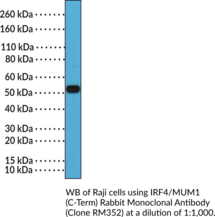Territorial Availability: Available through Bertin Technologies only in France
- Correlated keywords
- RM-352 IRF-4 MUM-1 IL4 NFkB Lipopolysaccharide
- Product Overview:
Interferon regulatory factor 4 (IRF4), also known as multiple myeloma oncogene 1 (MUM1), is a transcription factor and member of the IRF family with roles in lymphocyte activation and the generation of immunoglobulin-secreting (Ig-secreting) plasma cells.{60143,60144} It is composed of an N-terminal DNA binding domain, a linker domain, an interferon activation domain, and a C-terminal autoinhibitory region.{60145} IRF4 is primarily expressed in plasma cells and activated T cells but is also expressed in the heart, kidney, liver, and brain.{60144,60145} Unlike other IRF transcription factors, IRF4 is not IFN-responsive and is activated by induction of the NF-?B pathway by various activators of lymphocyte activation and differentiation, such as LPS, concanavalin A (Item No. 14951), bacterial toxins, IL-4, and antigen receptor engagement.{60144} Irf4-/- mice lack Ig-secreting plasma cells, as well as exhibit defective T helper cell differentiation and decreased survival in a model of bacterial CpG-induced septic shock.{60146} IRF4 expression is associated with poor prognosis in patients with B cell chronic lymphocytic leukemia/small lymphocytic lymphoma (B-CLL/SLL).{60147} Cayman’s IRF4/MUM1 (C-Term) Rabbit Monoclonal Antibody can be used for immunohistochemistry (IHC) and Western blot (WB) applications.
Cayman Chemical’s mission is to help make research possible by supplying scientists worldwide with the basic research tools necessary for advancing human and animal health. Our utmost commitment to healthcare researchers is to offer the highest quality products with an affordable pricing policy.
Our scientists are experts in the synthesis, purification, and characterization of biochemicals ranging from small drug-like heterocycles to complex biolipids, fatty acids, and many others. We are also highly skilled in all aspects of assay and antibody development, protein expression, crystallization, and structure determination.
Over the past thirty years, Cayman developed a deep knowledge base in lipid biochemistry, including research involving the arachidonic acid cascade, inositol phosphates, and cannabinoids. This knowledge enabled the production of reagents of exceptional quality for cancer, oxidative injury, epigenetics, neuroscience, inflammation, metabolism, and many additional lines of research.
Our organic and analytical chemists specialize in the rapid development of manufacturing processes and analytical methods to carry out clinical and commercial GMP-API production. Pre-clinical drug discovery efforts are currently underway in the areas of bone restoration and repair, muscular dystrophy, oncology, and inflammation. A separate group of Ph.D.-level scientists are dedicated to offering Hit-to-Lead Discovery and Profiling Services for epigenetic targets. Our knowledgeable chemists can be contracted to perform complete sample analysis for analytes measured by the majority of our assays. We also offer a wide range of analytical services using LC-MS/MS, HPLC, GC, and many other techniques.
Accreditations
ISO/IEC 17025:2005
ISO Guide 34:2009
Cayman is a leader in the field of emerging drugs of abuse, providing high-purity Schedule I-V Controlled Substances to federally-licensed laboratories and qualified academic research institutions for forensic analyses. We are certified by ACLASS Accreditation Services with dual accreditation to ISO/IEC 17025:2005 and ISO Guide 34:2009.





